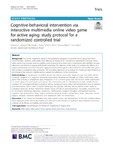Mostrar o rexistro simple do ítem
Cognitive-behavioral intervention via interactive multimedia online video game for active aging: study protocol for a randomized controlled trial
| dc.contributor.author | Vázquez, Fernando L. | |
| dc.contributor.author | Torres, Ángela J. | |
| dc.contributor.author | Otero, Patricia | |
| dc.contributor.author | Blanco Seoane, Vanessa | |
| dc.contributor.author | López, Lara | |
| dc.contributor.author | García-Casal, J. Antonio | |
| dc.contributor.author | Arrojo, Manuel | |
| dc.date.accessioned | 2020-03-24T08:46:54Z | |
| dc.date.available | 2020-03-24T08:46:54Z | |
| dc.date.issued | 2019 | |
| dc.identifier.citation | Vázquez, F.L., Torres, Á.J., Otero, P. et al. Cognitive-behavioral intervention via interactive multimedia online video game for active aging: study protocol for a randomized controlled trial. Trials 20, 692 (2019). https://doi.org/10.1186/s13063-019-3859-5 | es_ES |
| dc.identifier.issn | 3181-5656 | |
| dc.identifier.uri | http://hdl.handle.net/2183/25220 | |
| dc.description.abstract | [Abstract] Background Due to the progressive aging of the population, programs to promote active aging have been recommended. However, older adults have difficulty accessing them. Interventions administered through online video games may increase their accessibility, and complementing these with a smartphone app will likely increase adherence and allow for ongoing professional monitoring. The objective of this study is to evaluate the efficacy of a cognitive-behavioral intervention for active aging administered through an online interactive multimedia video game that includes a smartphone app companion. The secondary objectives are to analyze the moderators and mediators of the change in the outcome variables and to evaluate the adherence to the intervention. Methods/design A randomized controlled clinical trial will be conducted. Adults 45 years and older will be randomly assigned to a cognitive-behavioral intervention administered through an online multimedia video game that includes a smartphone app companion or to a control group that will receive online information on active aging (274 participants per group). The intervention will be administered in eight weekly 45-min modules. An investigator-blinded evaluation will be conducted using online self-administered tests at baseline, post-intervention, and 6- and 12-month follow-ups. The primary outcome will be mental health status as evaluated using the 36-item Short-Form Health Survey (SF-36) at post-intervention. Secondary outcomes will be emotional well-being, depressive symptoms, reinforcement, negative thoughts, self-reported memory, cognitive task performance, sleep hygiene behaviors, physical activity, eating habits, body mass index, social support, dropout, treatment adherence, and satisfaction with the intervention. Discussion If the results are favorable, this study would involve the development of the first evidence-based active aging promotion intervention based on a video game that includes a smartphone app companion, providing evidence on its efficacy, accessibility, and clinical utility. Trial registration ClinicalTrials.gov, NCT03643237. Registered 27 August 2018. | es_ES |
| dc.description.sponsorship | EXP - 00091195/ ITC-20161137; 2018-PU054 | es_ES |
| dc.language.iso | eng | es_ES |
| dc.relation.uri | https://trialsjournal.biomedcentral.com/articles/10.1186/s13063-019-3859-5 | es_ES |
| dc.rights | Atribución 4.0 España | es_ES |
| dc.rights.uri | http://creativecommons.org/licenses/by/4.0/ es | * |
| dc.subject | Older adults | es_ES |
| dc.subject | Video games | es_ES |
| dc.subject | Active ageing | es_ES |
| dc.subject | Health promotion | es_ES |
| dc.subject | Study protocol | es_ES |
| dc.title | Cognitive-behavioral intervention via interactive multimedia online video game for active aging: study protocol for a randomized controlled trial | es_ES |
| dc.type | info:eu-repo/semantics/article | es_ES |
| dc.rights.access | info:eu-repo/semantics/openAccess | es_ES |
| UDC.journalTitle | Trials | es_ES |
| UDC.volume | 20 | es_ES |
| UDC.issue | 692 | es_ES |
| UDC.startPage | 1 | es_ES |
| UDC.endPage | 15 | es_ES |
| dc.identifier.doi | doi.org/10.1186/s13063-019-3859-5 |
Ficheiros no ítem
Este ítem aparece na(s) seguinte(s) colección(s)
-
UI- UIPSAL - Artigos [30]






